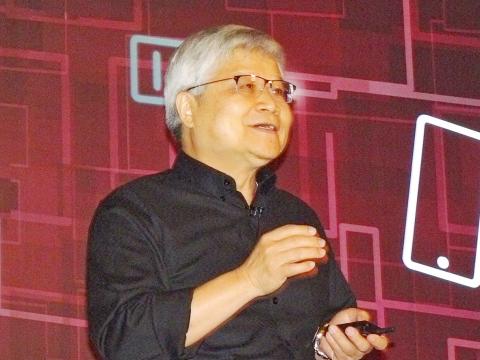Taiwan Semiconductor Manufacturing Co (TSMC, 台積電) yesterday announced plans to start trial production of 5-nanometer (nm) chips in the second quarter of 2019, as the world’s largest contract chipmaker sought to reassure clients of its role as a trusted technology and capacity partner.
The remarks by TSMC came after rival Samsung Electronics Co on Wednesday announced plans to spin off its foundry business to avoid conflicts of interest with customers.
“Our mission is to create technology and to provide capacity in catering to your needs. We can work together,” TSMC co-CEO C.C. Wei (魏哲家) said at an annual technology symposium in Hsinchu.

Photo: CNA
“We do not believe that any company that makes competing products can really cooperate with you,” Wei said, in a veiled reference to Samsung’s dual roles as a proprietary chip manufacturer and foundry service provider.
TSMC has been investing heavily in next-generation technologies to expand its business and gain bigger shares of top customers’ orders.
Last year, the chipmaker spent a record-high US$2.21 billion on research and development (R&D), Wei said.
That represented an increase of about 7 percent from US$2.07 billion in 2015.
The annual R&D budget has consistently risen and this year’s figure “will be astonishing,” he said.
TSMC supplies chips to 450 customers, including Apple Inc, Nvidia Inc and MediaTek Inc (聯發科).
To maintain its technology leadership, Wei said the company would commence small volume production of 7-nanometer chips later this quarter, paving the way for mass production next year.
Trial production of 5-nanometer chips are to start in the second quarter of 2019 and mass production in 2020, Wei said, in line with the company’s aim of upgrading its node technology by one generation every two years.
On Wednesday, Samsung said that it would lead the industry with its technology roadmap of 8-nanometer, 7-nanometer, 6-nanometer, 5-nanometer and 4-nanometer processes. The South Korean firm expects its 8-nanometer chips to come out later this year and 7nm chips next year.
C.C. Tsai (蔡志群), a senior director at TSMC, told the symposium that global semiconductor revenue is expected to increase by 7 percent year-on-year to US$383 billion this year, backed by growing smartphone demand.
Overall smartphone shipments this year are forecast to increase 6 percent annually to 1.55 billion units, with China outpacing the world by posting growth of 10 percent to 852 million units, Tsai said.
Tsai cited some uncertainties that could affect shipments, including tight supply of memory chips, customer response to new iPhone features such as replacement of the home button with a touch module, and Chinese smartphone vendors redesigning form factors which could delay shipments.

Vincent Wei led fellow Singaporean farmers around an empty Malaysian plot, laying out plans for a greenhouse and rows of leafy vegetables. What he pitched was not just space for crops, but a lifeline for growers struggling to make ends meet in a city-state with high prices and little vacant land. The future agriculture hub is part of a joint special economic zone launched last year by the two neighbors, expected to cost US$123 million and produce 10,000 tonnes of fresh produce annually. It is attracting Singaporean farmers with promises of cheaper land, labor and energy just over the border.

US actor Matthew McConaughey has filed recordings of his image and voice with US patent authorities to protect them from unauthorized usage by artificial intelligence (AI) platforms, a representative said earlier this week. Several video clips and audio recordings were registered by the commercial arm of the Just Keep Livin’ Foundation, a non-profit created by the Oscar-winning actor and his wife, Camila, according to the US Patent and Trademark Office database. Many artists are increasingly concerned about the uncontrolled use of their image via generative AI since the rollout of ChatGPT and other AI-powered tools. Several US states have adopted

A proposed billionaires’ tax in California has ignited a political uproar in Silicon Valley, with tech titans threatening to leave the state while California Governor Gavin Newsom of the Democratic Party maneuvers to defeat a levy that he fears would lead to an exodus of wealth. A technology mecca, California has more billionaires than any other US state — a few hundred, by some estimates. About half its personal income tax revenue, a financial backbone in the nearly US$350 billion budget, comes from the top 1 percent of earners. A large healthcare union is attempting to place a proposal before

KEEPING UP: The acquisition of a cleanroom in Taiwan would enable Micron to increase production in a market where demand continues to outpace supply, a Micron official said Micron Technology Inc has signed a letter of intent to buy a fabrication site in Taiwan from Powerchip Semiconductor Manufacturing Corp (力積電) for US$1.8 billion to expand its production of memory chips. Micron would take control of the P5 site in Miaoli County’s Tongluo Township (銅鑼) and plans to ramp up DRAM production in phases after the transaction closes in the second quarter, the company said in a statement on Saturday. The acquisition includes an existing 12 inch fab cleanroom of 27,871m2 and would further position Micron to address growing global demand for memory solutions, the company said. Micron expects the transaction to